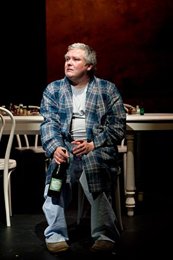Chekhov and Friel, Friel and Chekhov... over the years, the names of these two master playwrights have become almost inextricably linked. Their finest plays focus on resignation in the face of seismic social change, on papering over deeply suppressed personal turmoil with ceaseless chat, on facing into an uncertain, bleak future with stoical determination, gathering one’s inner resources and going on.
Friel has said that among the possible reasons for his attraction to Chekhov is that his characters behave as if old certainties were as sustaining as ever, even though they know in their hearts that their society is in melt-down. Or maybe it is because they seem to expect that their problems will disappear if they talk about them – endlessly.
Through this exemplary reworking of arguably Chekhov’s greatest play, Friel comes so close in spirit and ideology to his Russian counterpart that, twenty minutes in, the experience is almost like being back in Ballybeg, watching through our fingers the disintegration of an affluent but somewhat dysfunctional family, wracked with envy, unrequited love, frustration, self-contempt and insecurity, in a world which is slowly turning against them.
 In his insightful revival of the play, which was premiered at the Gate Theatre in Dublin in 1998, Mick Gordon affectingly conjures both the torrent of words and the long, eloquent silences, which are the truest reflections of the hearts and minds of the owners and occupants of the Voynitsky estate. In Conleth Hill, here making a keenly anticipated homecoming from his award-strewn career in London, he has an actor who is eminently capable of directing and controlling sudden switches from humour to despair, from garrulous self-analysis to seething, speechless anger.
In his insightful revival of the play, which was premiered at the Gate Theatre in Dublin in 1998, Mick Gordon affectingly conjures both the torrent of words and the long, eloquent silences, which are the truest reflections of the hearts and minds of the owners and occupants of the Voynitsky estate. In Conleth Hill, here making a keenly anticipated homecoming from his award-strewn career in London, he has an actor who is eminently capable of directing and controlling sudden switches from humour to despair, from garrulous self-analysis to seething, speechless anger.
Hill plays Vanya, who, together with his niece Sonya (Siobhan McSweeney), has presided over the running of the family estate since the death of his sister. They may not have made a tremendous fist of it, but their efforts have provided the household with a reasonable standard of material comfort while enabling a glossy urban lifestyle for his brother-in-law, the pompous, ailing academic Alexander Serebryakov (Ian McElhinney) and his glamorous young wife Elena (Orla Fitzgerald).
The arrival of this mismatched couple for a summer break throws the solidly balanced domestic order into complete disarray. Barbara Adair’s wonderfully realised old nanny Marina bemoans the substitution of ‘dinner’ for ‘lunch’, ‘afternoon tea’ for ‘dinner’ and the constant brewing of herbal tea, even during sleeping hours.
But, more threateningly, is the kindling of a dangerous crackle of sexual tension. Vanya, a frustrated emotional cripple, is in love with Elena, nervily and a little inconsistently played by Fitzgerald. Every time he glimpses her, Hill cannot resist rolling the vowels and consonants of her name lasciviously on his tongue, yet when he catches her in a steamy embrace with Declan Conlon’s sardonic, pleasure-seeking doctor Mikhail Astrov, he crumples like a small, embarrassed boy, beset with disappointment and mortification.
Meanwhile, McSweeney’s faux-cheerful, doughty Sonya, struggles to contain her feelings for Astrov and her excruciating confession, followed by a heroic coming to terms with inevitable rejection, more than makes up for the deadening effect of a dip in tension towards the end of Act 2, when she and Elena strangely seemed to turn into two young girls at a sleepover party.
Conlon and Hill make a powerful pairing, the former enthusiastically presenting his survey of the dwindling plantation to the bored Elena, while comparing the estate to a beehive, in which Vanya and Sonya are the workers and she the queen drone. In a tightly controlled, unselfish but virtuoso performance, Hill vascillates between rebellious adolescent in the presence of his exotic, politically-driven mother (Stella McCusker), loveable uncle to Sonya, laddish drinking buddy to Astrov, furious critic of Serebryakov and thwarted admirer of Elena.
Gordon’s vision is very much grounded in the here and now, stripped right back through Igor Vasiljev’s abstract, minimalist set, which echoes to Mike Furness’ atmospheric score. The once-opulent interior of the great house has been pared back to a line of whitewood chairs, while the window view of the abundant garden is reduced and distanced by the closing in of a series of huge, seasonally tinted panels. And here and there, the spirit of Russia lingers, in the shape of the ever-present ornate silver samovar, in old Telegin’s (Ciaran McIntyre) fond tales of an idealised European past, and the jingle of the bells on the departing troikas, as guests take their leave and life returns to a fruitless, long drawn out normality of sorts.
Jane Coyle is a Belfast-based freelance arts journalist and critic, who contributes regularly to The Irish Times, The Stage, Culture Northern Ireland and BBC Radio Ulster.